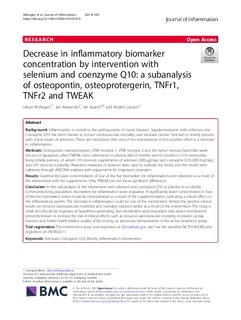Decrease in inflammatory biomarker concentration by intervention with selenium and coenzyme Q10: a subanalysis of osteopontin, osteoprotergerin, TNFr1, TNFr2 and TWEAK
Journal article, Peer reviewed
Published version
Permanent lenke
http://hdl.handle.net/11250/2644995Utgivelsesdato
2019Metadata
Vis full innførselSamlinger
Sammendrag
Background Inflammation is central to the pathogenesis of many diseases. Supplementation with selenium and coenzyme Q10 has been shown to reduce cardiovascular mortality, and increase cardiac function in elderly persons with a low intake of selenium. There are indications that one of the mechanisms of this positive effect is a decrease in inflammation. Methods Osteopontin, osteoprotegerin, sTNF receptor 1, sTNF receptor 2 and the tumor necrosis factor-like weak inducer of apoptosis called TWEAK, were determined in plasma after 6 months and 42 months in 219 community-living elderly persons, of whom 119 received supplements of selenium (200 μg/day) and coenzyme Q10 (200 mg/day), and 101 received a placebo. Repeated measures of variance were used to evaluate the levels, and the results were validated through ANCOVA analyses with adjustments for important covariates. Results Significantly lower concentrations of four of the five biomarkers for inflammation were observed as a result of the intervention with the supplements. Only TWEAK did not show significant differences. Conclusion In this sub-analysis of the intervention with selenium and coenzyme Q10 or placebo in an elderly community-living population, biomarkers for inflammation were evaluated. A significantly lower concentration in four of the five biomarkers tested could be demonstrated as a result of the supplementation, indicating a robust effect on the inflammatory system. The decrease in inflammation could be one of the mechanisms behind the positive clinical results on reduced cardiovascular morbidity and mortality reported earlier as a result of the intervention. The study is small and should be regarded as hypothesis-generating, but nonetheless adds important data about mechanisms presently known to increase the risk of clinical effects such as reduced cardiovascular mortality, increased cardiac function and better health-related quality of life scoring, as previously demonstrated in the active treatment group . Trial registration The intervention study was registered at Clinicaltrials.gov, and has the identifier NCT01443780 and registered on 09/30/2011.

